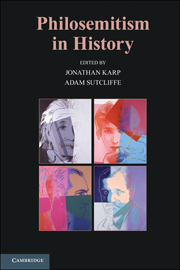Book contents
- Frontmatter
- Contents
- Notes on Contributors
- Introduction
- PART I MEDIEVAL AND EARLY MODERN FRAMEWORKS
- PART II THREE EUROPEAN PHILOSEMITES
- PART III THE CULTURAL POLITICS OF PHILOSEMITISM IN VICTORIAN BRITAIN AND IMPERIAL GERMANY
- 7 Bad Jew/Good Jewess
- 8 Anti-“Philosemitism” and Anti-Antisemitism in Imperial Germany
- 9 From Recognition to Consensus
- PART IV AMERICAN PHILOSEMITISMS
- PART V PHILOSEMITISM IN POST-HOLOCAUST EUROPE
- Index
- References
8 - Anti-“Philosemitism” and Anti-Antisemitism in Imperial Germany
Published online by Cambridge University Press: 05 June 2012
- Frontmatter
- Contents
- Notes on Contributors
- Introduction
- PART I MEDIEVAL AND EARLY MODERN FRAMEWORKS
- PART II THREE EUROPEAN PHILOSEMITES
- PART III THE CULTURAL POLITICS OF PHILOSEMITISM IN VICTORIAN BRITAIN AND IMPERIAL GERMANY
- 7 Bad Jew/Good Jewess
- 8 Anti-“Philosemitism” and Anti-Antisemitism in Imperial Germany
- 9 From Recognition to Consensus
- PART IV AMERICAN PHILOSEMITISMS
- PART V PHILOSEMITISM IN POST-HOLOCAUST EUROPE
- Index
- References
Summary
To the uninitiated, the imperial German era might well seem like the Golden Age of philosemitism. Rarely have the very terms “philosemitism,” “philosemite,” and “philosemitic” featured so prominently, pervasively, and persistently in public discourse as they did in Germany in the four decades or so leading up to the First World War. Yet this almost obsessive interest in “philosemitism” by no means bears testimony to a deep yearning for relations between non-Jews and Jews that are based on genuine solidarity, mutual respect, and constructive engagement. For the terms “philosemitism,” “philosemite,” and “philosemitic” were used well nigh universally not in an affirmative sense but rather with a pejorative intent. In imperial Germany, to be called a “philosemite” was a bad thing, an accusation against which even many avowed “anti-antisemites” (i.e., opponents of antisemitism) felt the need to defend themselves.
In a number of respects, imperial Germany confronts us with a highly complex constellation when it comes to the study of relations between Jews and non-Jews and notions of “philosemitism.” With the emergence of modern political antisemitism proper in the 1870s begins the comparatively short era of self-avowed, overt, and proud antisemitism. Since the Shoah antisemitism generally no longer dares speak its name. Even those who nurture a strong conscious enmity toward “the Jews” and would condone or actively participate in measures designed to do them serious harm would today almost invariably deny in public that they are antisemites.
- Type
- Chapter
- Information
- Philosemitism in History , pp. 170 - 189Publisher: Cambridge University PressPrint publication year: 2011
References
- 1
- Cited by

